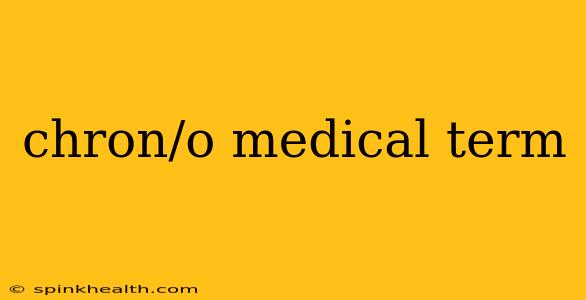Decoding the Medical Term "Chrono-"
The prefix "chrono-" in a medical context isn't just a random string of letters; it's a powerful indicator that we're dealing with something related to time. Imagine a detective meticulously piecing together a timeline of events – that's essentially what "chrono-" does in medical terminology. It signifies the timing, duration, or sequence of events within a biological process or disease.
Let's dive into the fascinating world of "chrono-" and explore its various applications in medicine. Our journey will unravel its meaning through real-world examples and address some common questions surrounding this crucial medical prefix.
What does chrono- mean in medical terms?
The simple answer is time. But it’s more nuanced than that. "Chrono-" doesn't just refer to the passage of time itself, but rather to the temporal aspects of biological processes. This could mean the timing of an event (when it occurs), its duration (how long it lasts), or its rhythm or periodicity (how regularly it repeats).
Imagine a doctor observing a patient's heart rhythm. The regularity of the heartbeat, the intervals between beats, and any deviations from a normal rhythm are all elements that fall under the umbrella of "chronological" analysis. This is where terms like "chronotropic" come into play, referring to the influence of factors on the rate of a process.
What are some examples of medical terms using chrono-?
The use of "chrono-" is surprisingly widespread throughout medical terminology. Here are a few key examples:
-
Chronobiology: This field studies the biological rhythms and cycles within living organisms, encompassing everything from the sleep-wake cycle to hormonal fluctuations. Understanding chronobiology is vital for optimizing treatment schedules and understanding disease progression. For example, chemotherapy might be timed according to the body’s natural rhythms for better efficacy and reduced side effects.
-
Chronotherapy: This involves the strategic timing of treatments, often aligned with the body’s natural biological clocks. For instance, adjusting medication schedules to coincide with peak symptom times or hormone levels can significantly improve therapeutic outcomes.
-
Chronopharmacology: This area investigates how the timing of drug administration impacts the effectiveness and toxicity of medications. Some medications are most effective when taken at specific times of day, due to variations in the body’s metabolism and sensitivity throughout the 24-hour cycle.
-
Chronic disease: While seemingly unrelated, the term "chronic" contains the same root. Chronic conditions, by definition, are long-lasting or persistent, indicating a prolonged duration of illness over time. This highlights the importance of time in defining and classifying many diseases.
How is chrono- used in diagnostics and treatment?
The application of "chrono-" in medicine extends beyond simple definitions. It informs the very process of diagnosis and treatment. By understanding the temporal aspects of diseases, doctors can:
- Improve diagnostic accuracy: Tracking the progression of a disease over time can aid in its identification and differentiation from other conditions.
- Personalize treatment strategies: Recognizing that biological processes vary across individuals and over time allows for the tailoring of treatments to better suit patient needs.
- Predict disease outcomes: Analyzing the temporal patterns of a disease can help in predicting its future course and potential complications.
- Optimize medication effectiveness: Timing medication administration to coincide with peak symptom times or hormone fluctuations is a critical aspect of chronopharmacology.
What other prefixes are similar to chrono-?
While "chrono-" uniquely focuses on time, several other prefixes relate to time-dependent aspects within medical terminology. These prefixes often provide additional context:
- Hemo-: relating to blood
- Cyto-: relating to cells
- Neuro-: relating to the nervous system
These prefixes often combine with "chrono-" to create more specific terms, such as "chrononeuroendocrinology," a field that studies the interactions between the body's biological clock, nervous system, and endocrine system.
In conclusion, "chrono-" plays a significant role in medical terminology, denoting the critical aspect of time in understanding biological processes, diagnosing diseases, and optimizing treatment strategies. Its application highlights the importance of considering the temporal dimension in the pursuit of better healthcare.

